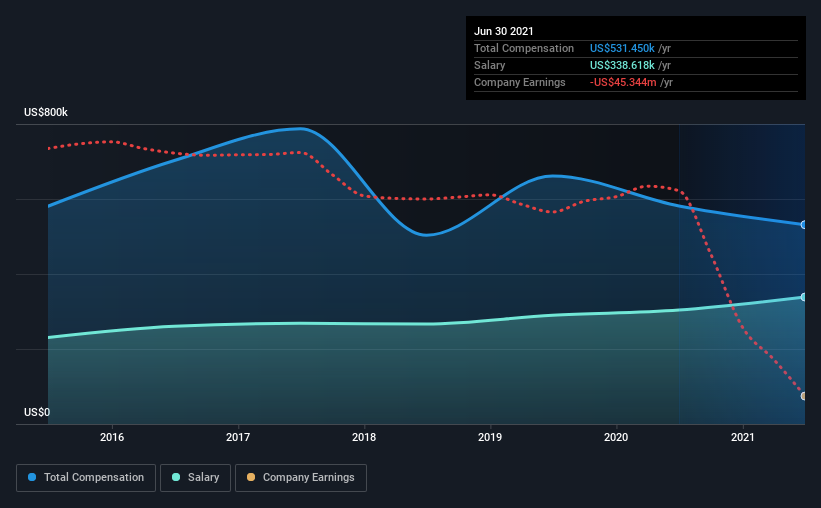Why We Think Opthea Limited's (ASX:OPT) CEO Compensation Is Not Excessive At All
Performance at Opthea Limited (ASX:OPT) has been rather uninspiring recently and shareholders may be wondering how CEO Megan Baldwin plans to fix this. One way they can exercise their influence on management is through voting on resolutions, such as executive remuneration at the next AGM, coming up on 18 October 2021. Setting appropriate executive remuneration to align with the interests of shareholders may also be a way to influence the company performance in the long run. In our opinion, CEO compensation does not look excessive and we discuss why.
See our latest analysis for Opthea
How Does Total Compensation For Megan Baldwin Compare With Other Companies In The Industry?
Our data indicates that Opthea Limited has a market capitalization of AU$446m, and total annual CEO compensation was reported as US$531k for the year to June 2021. We note that's a decrease of 8.6% compared to last year. In particular, the salary of US$338.6k, makes up a huge portion of the total compensation being paid to the CEO.
In comparison with other companies in the industry with market capitalizations ranging from AU$272m to AU$1.1b, the reported median CEO total compensation was US$797k. In other words, Opthea pays its CEO lower than the industry median. Moreover, Megan Baldwin also holds AU$4.9m worth of Opthea stock directly under their own name, which reveals to us that they have a significant personal stake in the company.
Component | 2021 | 2020 | Proportion (2021) |
Salary | US$339k | US$304k | 64% |
Other | US$193k | US$278k | 36% |
Total Compensation | US$531k | US$581k | 100% |
Talking in terms of the industry, salary represented approximately 57% of total compensation out of all the companies we analyzed, while other remuneration made up 43% of the pie. According to our research, Opthea has allocated a higher percentage of pay to salary in comparison to the wider industry. If salary is the major component in total compensation, it suggests that the CEO receives a higher fixed proportion of the total compensation, regardless of performance.
A Look at Opthea Limited's Growth Numbers
Over the last three years, Opthea Limited has shrunk its earnings per share by 32% per year. Its revenue is down 5.1% over the previous year.
Overall this is not a very positive result for shareholders. And the fact that revenue is down year on year arguably paints an ugly picture. These factors suggest that the business performance wouldn't really justify a high pay packet for the CEO. Looking ahead, you might want to check this free visual report on analyst forecasts for the company's future earnings..
Has Opthea Limited Been A Good Investment?
We think that the total shareholder return of 108%, over three years, would leave most Opthea Limited shareholders smiling. This strong performance might mean some shareholders don't mind if the CEO were to be paid more than is normal for a company of its size.
In Summary...
While the return to shareholders does look promising, it's hard to ignore the lack of earnings growth and this makes us wonder if these strong returns can continue. Shareholders might want to question the board about these concerns, and revisit their investment thesis for the company.
CEO compensation is an important area to keep your eyes on, but we've also need to pay attention to other attributes of the company. In our study, we found 3 warning signs for Opthea you should be aware of, and 1 of them is concerning.
Important note: Opthea is an exciting stock, but we understand investors may be looking for an unencumbered balance sheet and blockbuster returns. You might find something better in this list of interesting companies with high ROE and low debt.
This article by Simply Wall St is general in nature. We provide commentary based on historical data and analyst forecasts only using an unbiased methodology and our articles are not intended to be financial advice. It does not constitute a recommendation to buy or sell any stock, and does not take account of your objectives, or your financial situation. We aim to bring you long-term focused analysis driven by fundamental data. Note that our analysis may not factor in the latest price-sensitive company announcements or qualitative material. Simply Wall St has no position in any stocks mentioned.
Have feedback on this article? Concerned about the content? Get in touch with us directly. Alternatively, email editorial-team (at) simplywallst.com.

